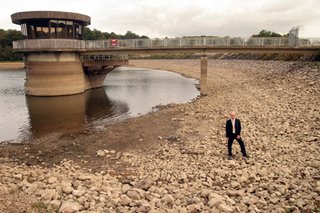 At a time when millions of households in England and Wales are facing the second year in a row of inflation-busting water price increases, after Ofwat has agreed that average bills should rise between 2005 and 2010 by 18 percent above inflation, it is a bit rich that some water companies should now be enforcing hosepipe bans.
At a time when millions of households in England and Wales are facing the second year in a row of inflation-busting water price increases, after Ofwat has agreed that average bills should rise between 2005 and 2010 by 18 percent above inflation, it is a bit rich that some water companies should now be enforcing hosepipe bans. This is especially galling when these self-same companies have consistently failed to meet their target on water leakage, collectively losing about 200 million gallons a day through burst pipes.
Thus it is that there is more than a little hostility to the current attempts to save water, with even the GMB union pitching in, saying the bans could have been avoided if new reservoirs had been built. Only a fraction of the total rainfall was used by the public, the unions says, ranging from seven percent in the South East to just 0.24 per cent in Scotland.
Meanwhile, the gardening industry reacted with adversely to the ban, with Horticultural Trades Association spokesman David Gilchrist declaring that the industry was "angry" that it was being forced to pick up the tab for a hosepipe ban that disproportionately hit gardeners.
But while the water companies are taking the flak, the one organisation which is most responsible for the spiralling costs of water, and the distortion investment of priorities away from the supply of water and dealing with leakage, seems to be escaping Scot-free.
That organisation is, of course, the European Union, which has imposed costs of billions on the water industry, demanding often unrealistic and arbitrary standards of purity for drinking water and sewage effluent. And, not content with that, the latest Water Framework Directive is set to cost a further £16 billion, all of which has to be met from customer charges.
With water pricing being such a sensitive political issue, it is unsurprising that the water companies have sought to cut back on investment in new mains and new reservoirs, but it is about time that the blame for the current situation was put fairly and squarely where it belongs.
COMMENT THREAD
No comments:
Post a Comment
Note: only a member of this blog may post a comment.